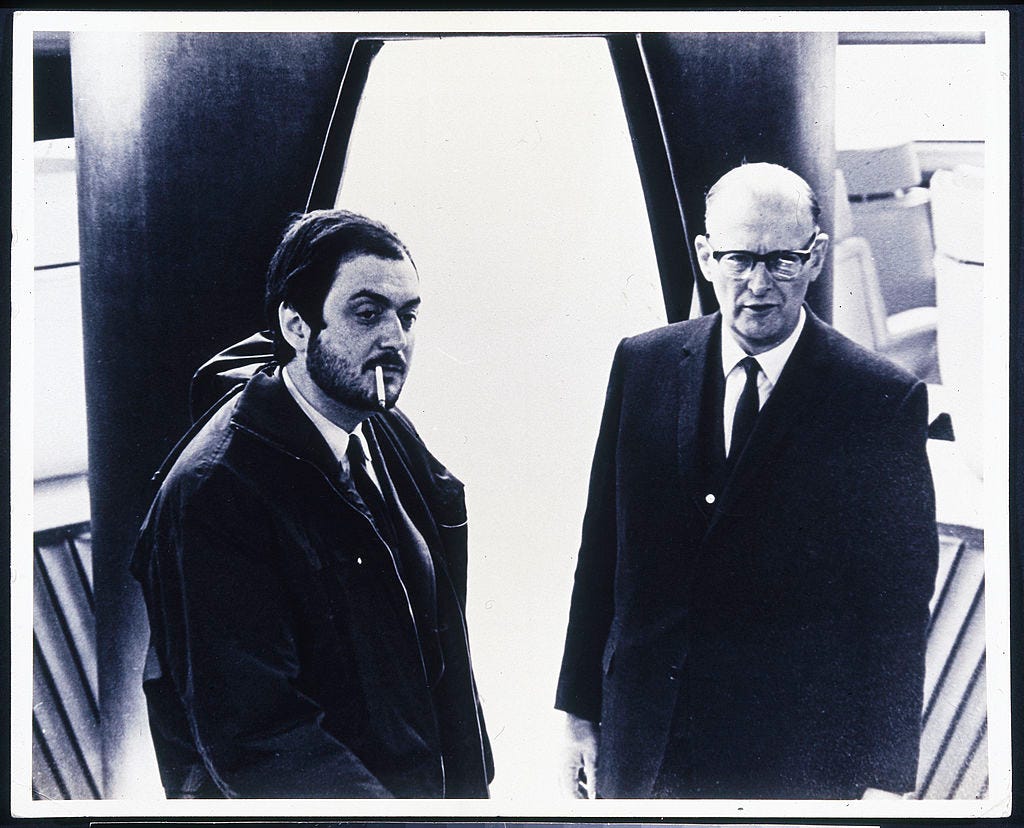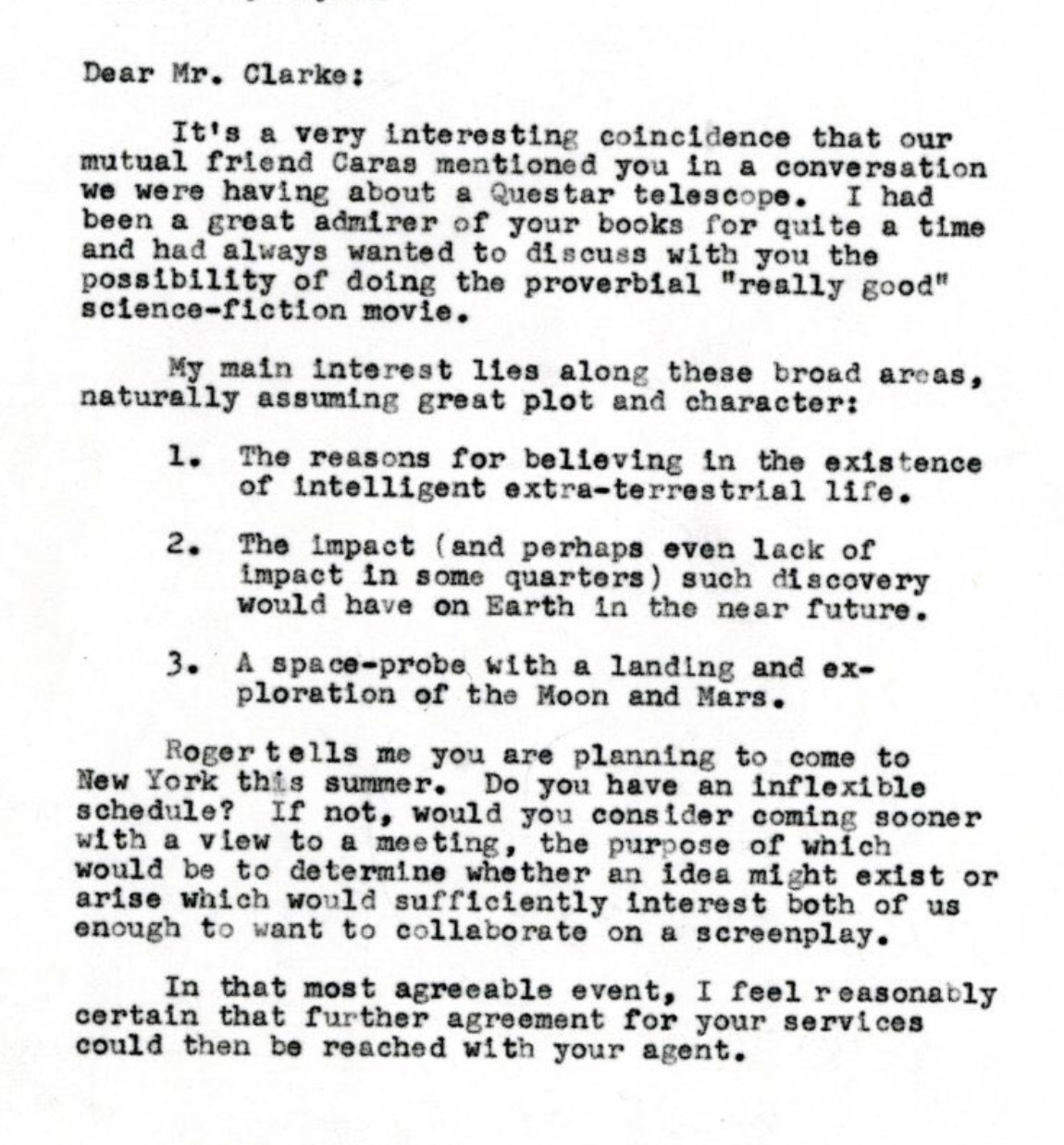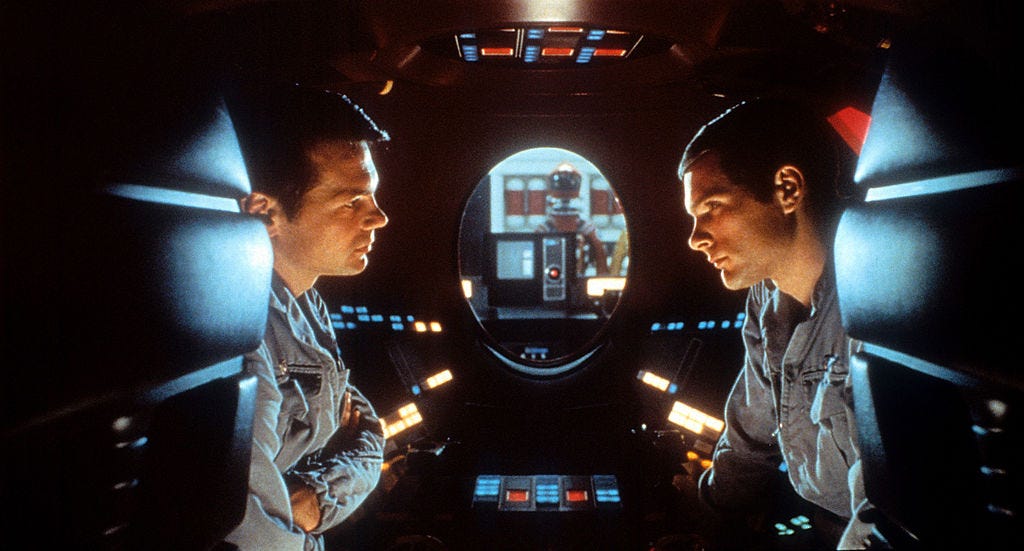The proverbial “really good” science-fiction movie
The birth of 2001: A Space Odyssey - PLUS Arthur C. Clarke replies to crackpots
The following letter, written on this day in 1964, can be found in the book, Letters of Note: Space—used with permission from Christiane Kubrick and Stanley Kubrick Film Archives LCC. The embedded audio, of the letter being read by Ferdinand Kingsley, is from the accompanying audiobook. Beneath it all is a bonus.
See also: a diary entry written by Arthur C. Clarke two years later, hours after seeing some early footage from the “masterpiece” they had on their hands.

On March 31st of 1964, esteemed filmmaker Stanley Kubrick initiated contact with author Arthur C. Clarke by way of this letter, in which Kubrick declared an interest in the two collaborating to produce, in his words, “the proverbial ‘really good’ science-fiction movie.” Clarke was immediately keen—so much so that just three weeks later, on April 22nd, the pair met at the Plaza Hotel in New York and, according to Clarke, “talked for eight solid hours about science fiction.” Four years later, the groundbreaking result of their partnership, 2001: A Space Odyssey, was released, a truly epic movie about space travel, human evolution and extraterrestrial life that spans time and space. It is considered a landmark in cinema.
(Transcript follows.)
March 31, 1964
Dear Mr Clarke:
It’s a very interesting coincidence that our mutual friend Caras mentioned you in a conversation we were having about a Questar telescope. I had been a great admirer of your books for quite a time and had always wanted to discuss with you the possibility of doing the proverbial “really good” science-fiction movie.
My main interest lies along these broad areas, naturally assuming great plot and character:
The reasons for believing in the existence of intelligent extra-terrestrial life.
The impact (and perhaps even lack of impact in some quarters) such discovery would have on Earth in the near future.
A space-probe with a landing and exploration of the Moon and Mars.
Roger tells me you are planning to come to New York this summer. Do you have an inflexible schedule? If not, would you consider coming sooner with a view to a meeting, the purpose of which would be to determine whether an idea might exist or arise which would sufficiently interest both of us enough to want to collaborate on a screenplay.
In that most agreeable event, I feel reasonably certain that further agreement for your services could then be reached with your agent.
Incidentally, “Sky & Telescope” advertise a number of scopes. If one has the room for a medium size scope on a pedestal, say the size of a camera tripod, is there any particular model in a class by itself, as the Questar is for small portable scopes?
Best regards,
Stanley Kubrick
BONUS
At the very end of his 1965 essay collection, Voices from the Sky, Arthur C. Clarke discusses the many letters he receives from readers—in particular those sent by “crackpots.” He then gives examples of the types of replies he would sometimes send. Here are a few.
Dear Sir,
Thank you for your letter and enclosures, which I have examined with care. It is obvious that you have spent a great deal of time on this project, and I regret that heavy pressure of work will not allow me to comment upon it at length. I think it may be of interest to Dr. Isaac Asimov, whose address is...
Yours faithfully,
Arthur C. Clarke
A reply he used for “exceptionally long and tedious letters” read as follows…
Dear Sir,
You may be right.
Yours,
Arthur C. Clarke
Says Clarke: “Very effective is the phony technical answer, which may run like this…”
Your treatment fails to explain the well-known fact that the locus of the contravariant tensor has noncommunicative divergence in the region of the transfinite singularity. A simple extension of your theory leads at once to the obviously fallacious conclusion that the polarized proton flux will result in a heuristic phase imbalance of the hypergeometric catenery, so that... etc. etc.
And finally, his “proudest invention,” which he called the “zero-information letter”—handwritten, crucially, with all neutral words “just legible” and where important words should be, a “squiggle” that looks like it ought to be a word. The example he gives:
Dear Sir,
Thank you for your squiggle letter of the 30th February, which has caused me much squiggle.
It is really astonishing that you have completely squiggle my squiggle! In particular, your statement that squiggle squiggle is actually squiggle squiggle is certainly one of the most remarkable pieces of squiggle that I have ever squiggle!
squiggle TO YOU!! I cannot too strongly suggest that you squiggle at the earliest possible moment.... etc., etc.
Yours squiggle,
Arthur C. squiggle
If you haven’t done so already, please consider supporting this project for a few pounds per month. Hit the button for details.





“You may be right.” 😂💯
Dave?